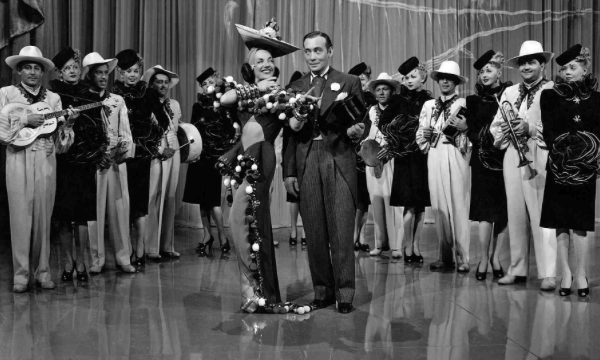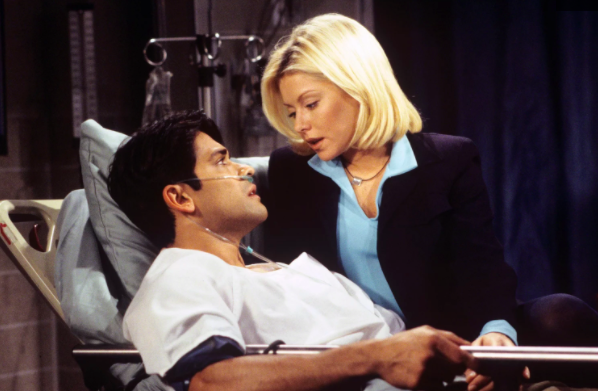Carmen Miranda is a national (registry) treasure…
The late half-Brazilian actress, singer and dancer’s work will now be preserved for all time.

The Library of Congress has added 25 films to the National Film Registry, including two of Miranda’s most memorable projects.
The annual selection helps to ensure that the movies will be preserved for all time. This year’s list brings the number of films in the registry to 650.
Down Argentine Way (1940), which established Betty Grable’s as the pinup queen, features the actress’ character traveling to South America and falling in love with Don Ameche.
Miranda, who was popular from the 1930s to the 1950s, made her Hollywood debut in the film, and her exotic clothing and Latin accent became her trademark.
The Gang’s All Here (1943), featured showgirl Alice Faye being romanced by a soldier who uses an assumed name and then turns out to be a rich playboy.
Miranda, nicknamed the “Brazilian Bombshell” is noted for her outrageous costume and signature fruit hat, which was highlighted in the legendary musical number “The Lady in the Tutti Frutti Hat.”
But Miranda isn’t the only one being immortalized in the National Film Registry…
Efraín Gutiérrez’s Please Don’t Bury Me Alive! (1976)
has also made the cut.
He wrote, directed and starred in the independent film, which is set in the San Antonio barrio in the early 1970s and tells the story of a young Chicano man questioning his and his people’s place in society as thousands of his Latino brethren return from the war in coffins during the turbulent days near the end of the Vietnam War.
Meantime, Felicia (1965), a 13-minute short subject, marketed as an educational film, has been included in the National Film Registry this year.
It centers on an unassuming-yet-articulate teenager Felicia Bragg, a high-school student of African-American and Hispanic descent. Felicia’s first-person narrative reflects her hopes and frustrations as she annotates footage of her family, school and neighborhood, creating a time capsule that’s both historically and culturally significant.
Here’s a look at the films featuring Latino talent that made the final cut:
2014 National Film Registry
Down Argentine Way (1940)
Betty Grable’s first starring role in a Technicolor musical happened only because Alice Faye had an attack of appendicitis, but Grable took advantage of the situation and quickly made herself as important to 20th Century-Fox as Faye. Released just over a year before America entered World War II, this film and others starring Grable established her as the pinup queen. The title explains much, with Grable traveling to South America and falling in love with Don Ameche. Carmen Miranda makes her American film debut, and the Nicolas Brothers’ unparalleled dance routines dazzle.
The Gang’s All Here (1943)
Although not remembered as well today as those put out by MGM, 20th Century-Fox’s big Technicolor musicals stand up well in comparison. Showgirl Alice Faye, Fox’s No. 1 musical star, is romanced by a soldier who uses an assumed name and then turns out to be a rich playboy. Carmen Miranda is also featured and her outrageous costume is highlighted in the legendary musical number “The Lady in the Tutti Frutti Hat.” Busby Berkeley, who had just finished a long stint directing musicals at MGM and an earlier one at Warner Bros., directs and choreographs the film.
Please Don’t Bury Me Alive! (1976)
The San Antonio barrio in the early 1970s is the setting for writer, director and star Efraín Gutiérrez’s independent piece, considered by historians to be the first Chicano feature film. A self-taught filmmaker, Gutiérrez not only created the film from top to bottom on a shoestring, he also acted as its initial distributor and chief promoter, negotiating bookings throughout the Southwest where it filled theaters in Chicano neighborhoods. He tells his story in the turbulent days near the end of the Vietnam War, as a young Chicano man questioning his and his people’s place in society as thousands of his Latino brethren return from the war in coffins. Chon Noriega, director of the UCLA Chicano Studies Research Center, wrote, “The film is important as an instance of regional filmmaking, as a bicultural and bilingual narrative, and as a precedent that expanded the way that films got made. …” Cultural historians often compare Gutiérrez to Oscar Micheaux, the pioneering African-American filmmaker who came to prominence in the 1920s.
Felicia (1965)
This 13-minute short subject, marketed as an educational film, records a slice of life in the Watts neighborhood of Los Angeles prior to the rebellions of 1965. Filmmakers Trevor Greenwood, Robert Dickson and Alan Gorg were UCLA film students when they crafted a documentary from the perspective of the unassuming-yet-articulate teenager Felicia Bragg, a high-school student of African-American and Hispanic descent. Felicia’s first-person narrative reflects her hopes and frustrations as she annotates footage of her family, school and neighborhood, creating a time capsule that’s both historically and culturally significant. Its provenance as an educational film continues today as university courses use “Felicia” to teach documentary filmmaking techniques and cite it as an example of how non-traditional sources, as well as mainstream television news, reflect and influence public opinion.
 Produced by and co-starring Robert Downey Jr., the HBO/A24 series is an espionage thriller and cross-culture satire about the struggles of a half-French, half-Vietnamese communist spy during the final days of the Vietnam War and his resulting exile in the United States.
Produced by and co-starring Robert Downey Jr., the HBO/A24 series is an espionage thriller and cross-culture satire about the struggles of a half-French, half-Vietnamese communist spy during the final days of the Vietnam War and his resulting exile in the United States.



